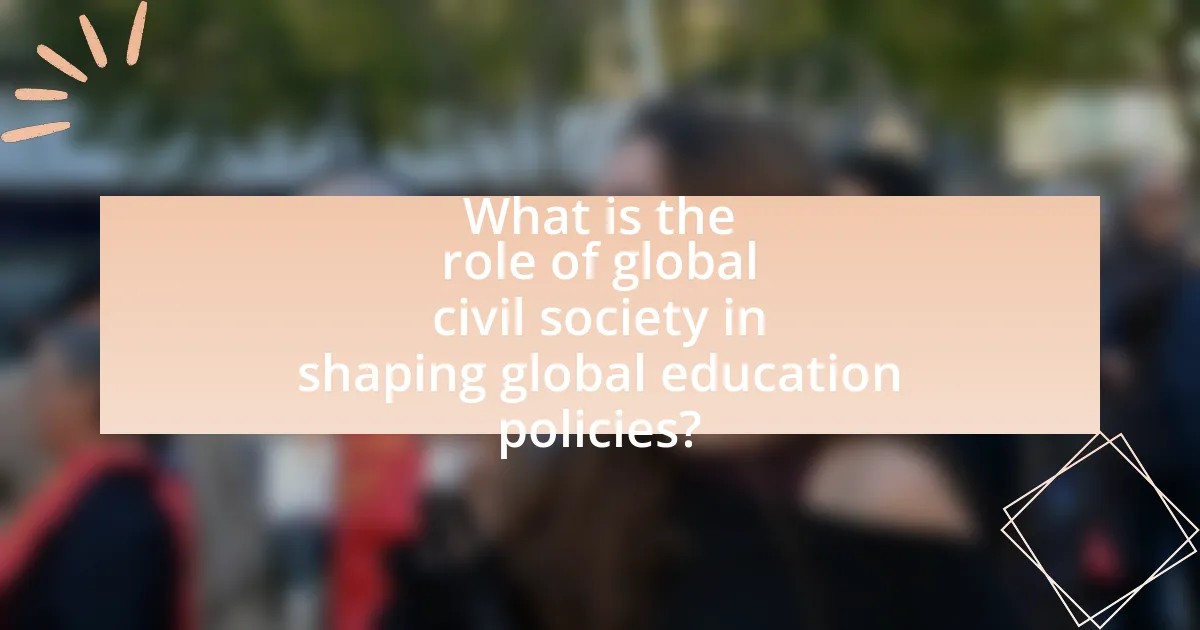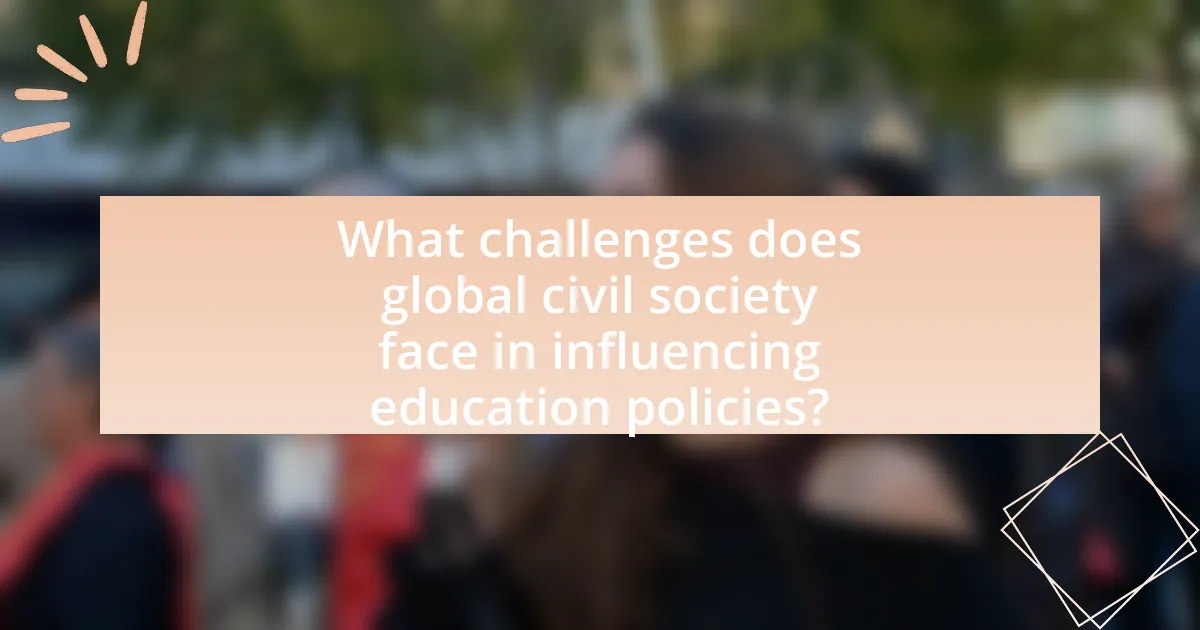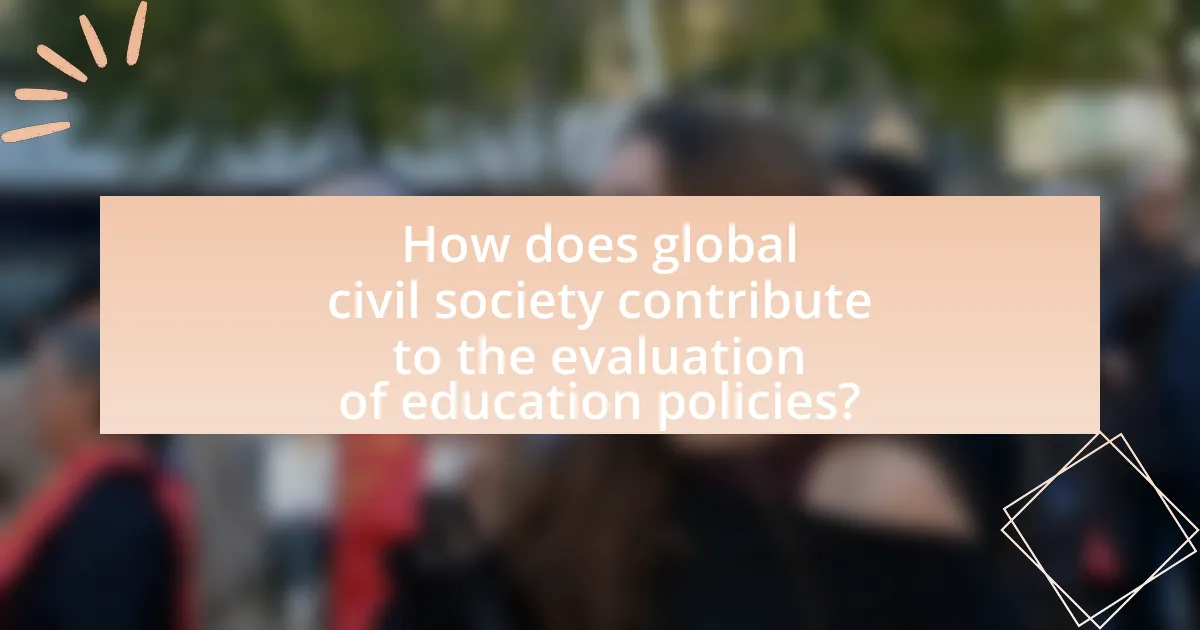Global civil society significantly influences global education policies by advocating for equitable access to education, shaping policy frameworks, and promoting accountability among governments and international organizations. Key organizations such as UNESCO, the Global Partnership for Education, and Save the Children play vital roles in this process through advocacy, resource mobilization, and collaboration with governments. The article explores how these organizations engage in policy development, the challenges they face, and the strategies they employ to promote educational reforms. Additionally, it examines the impact of political and economic factors on their efforts, the importance of representation, and best practices for enhancing their effectiveness in shaping education policies worldwide.

What is the role of global civil society in shaping global education policies?
Global civil society plays a crucial role in shaping global education policies by advocating for equitable access to education, influencing policy frameworks, and promoting accountability among governments and international organizations. Through various non-governmental organizations (NGOs), grassroots movements, and advocacy networks, global civil society mobilizes resources, shares best practices, and raises awareness about educational disparities. For instance, organizations like UNESCO and the Global Campaign for Education have successfully lobbied for the inclusion of education in the Sustainable Development Goals, highlighting the importance of education as a fundamental human right. This advocacy has led to increased funding and policy commitments from governments, demonstrating the significant impact of global civil society on shaping educational agendas worldwide.
How does global civil society influence education policy development?
Global civil society influences education policy development by advocating for inclusive and equitable education reforms through various organizations and networks. These entities, such as NGOs, grassroots movements, and international coalitions, mobilize resources, share best practices, and engage in policy dialogue with governments and international bodies. For instance, the Global Campaign for Education has successfully lobbied for the inclusion of education as a priority in the United Nations Sustainable Development Goals, demonstrating the power of civil society in shaping global education agendas. Additionally, research indicates that civil society organizations often provide critical data and analysis that inform policy decisions, ensuring that the voices of marginalized communities are represented in educational policy discussions.
What are the key organizations involved in global civil society and education?
Key organizations involved in global civil society and education include UNESCO, the Global Partnership for Education, and Save the Children. UNESCO, as a specialized agency of the United Nations, plays a crucial role in promoting education as a fundamental human right and setting global educational standards. The Global Partnership for Education focuses on mobilizing funding and resources to improve education in developing countries, emphasizing equity and quality. Save the Children advocates for children’s rights and works to ensure access to quality education, particularly in crisis-affected areas. These organizations collectively influence global education policies through advocacy, funding, and program implementation, thereby shaping educational outcomes worldwide.
How do these organizations collaborate with governments and institutions?
Organizations collaborate with governments and institutions through partnerships, advocacy, and policy development. These collaborations often involve joint initiatives aimed at improving educational outcomes, where organizations provide expertise and resources to support government-led programs. For instance, organizations like UNESCO work with national governments to implement educational frameworks and policies that align with global standards, facilitating knowledge exchange and capacity building. Additionally, civil society organizations engage in advocacy efforts to influence policy decisions, ensuring that the voices of marginalized communities are represented in educational reforms. This collaborative approach is evidenced by initiatives such as the Global Partnership for Education, which brings together governments, civil society, and private sector stakeholders to mobilize resources and implement effective education strategies worldwide.
What are the main objectives of global civil society in education?
The main objectives of global civil society in education include promoting equitable access to quality education, advocating for educational rights, and influencing policy reforms. Global civil society organizations work to ensure that marginalized groups, such as girls and children in low-income countries, receive educational opportunities, as evidenced by initiatives like the Global Partnership for Education, which aims to mobilize funding and support for education in developing nations. Additionally, these organizations strive to hold governments accountable for their commitments to education, as seen in the Education for All movement, which emphasizes the importance of inclusive and quality education for all children worldwide.
How does global civil society advocate for equitable access to education?
Global civil society advocates for equitable access to education through various strategies, including policy advocacy, grassroots mobilization, and partnerships with international organizations. These entities, such as non-governmental organizations (NGOs) and community groups, work to influence education policies by raising awareness about disparities in access and quality of education. For instance, organizations like Education International and Global Campaign for Education engage in lobbying efforts to promote inclusive education policies at national and international levels. They provide evidence-based research and data, such as UNESCO’s Global Education Monitoring Report, which highlights the need for equitable education funding and resources. Additionally, global civil society mobilizes communities to demand accountability from governments, ensuring that marginalized groups, including girls and children with disabilities, receive the educational opportunities they deserve.
What strategies does global civil society use to promote educational reforms?
Global civil society employs advocacy, coalition-building, and grassroots mobilization to promote educational reforms. Advocacy efforts often involve lobbying governments and international organizations to prioritize education in policy agendas, as seen in campaigns led by organizations like Education International, which represents teachers and education workers globally. Coalition-building among diverse stakeholders, including NGOs, community groups, and educational institutions, enhances collective influence, exemplified by the Global Partnership for Education, which unites various actors to improve education systems in developing countries. Grassroots mobilization engages local communities in the reform process, empowering them to demand quality education and accountability from authorities, as demonstrated by initiatives like the Global Campaign for Education, which mobilizes citizens to advocate for their right to education.

What challenges does global civil society face in influencing education policies?
Global civil society faces significant challenges in influencing education policies, primarily due to limited access to decision-making processes and varying levels of political will among governments. These organizations often struggle to engage effectively with policymakers, as many governments prioritize national interests over global civil society input. Additionally, disparities in resources and capacity among civil society organizations hinder their ability to advocate for educational reforms. For instance, a report by the Global Partnership for Education highlights that many grassroots organizations lack funding and technical expertise, which limits their influence on policy discussions. Furthermore, the complexity of education systems and the diversity of stakeholders involved create barriers to consensus-building, making it difficult for global civil society to present a unified voice.
How do political and economic factors impact global civil society’s efforts?
Political and economic factors significantly influence global civil society’s efforts by shaping the environment in which these organizations operate. Political stability or instability can either facilitate or hinder civil society initiatives; for example, in countries with strong democratic institutions, civil society organizations often have greater freedom to advocate for educational reforms. Conversely, in authoritarian regimes, such organizations may face repression, limiting their ability to effect change.
Economically, the availability of funding and resources directly affects the capacity of civil society to implement programs. For instance, during economic downturns, governments may reduce funding for education, which can lead to increased reliance on civil society organizations to fill gaps. According to a report by the Global Partnership for Education, in low-income countries, civil society plays a crucial role in advocating for educational access, especially when government resources are scarce. Thus, both political and economic contexts are critical in determining the effectiveness and reach of global civil society’s efforts in influencing education policies.
What role do funding and resources play in the effectiveness of global civil society?
Funding and resources are critical to the effectiveness of global civil society as they enable organizations to implement programs, advocate for policy changes, and mobilize communities. Adequate financial support allows civil society groups to conduct research, engage in outreach, and sustain operations, which are essential for influencing global education policies. For instance, organizations like Oxfam and Save the Children rely on funding to carry out initiatives that address educational inequities, demonstrating that resource availability directly correlates with their capacity to effect change. Furthermore, a report by the Global Partnership for Education highlights that increased funding for civil society organizations leads to improved educational outcomes in developing countries, underscoring the importance of financial resources in achieving their objectives.
How do cultural differences affect the implementation of education policies?
Cultural differences significantly affect the implementation of education policies by influencing values, beliefs, and practices within educational systems. For instance, in collectivist cultures, education policies may prioritize community involvement and consensus-building, while in individualistic cultures, policies might focus on personal achievement and competition. Research by the Organisation for Economic Co-operation and Development (OECD) highlights that countries with strong cultural ties to education, such as Finland, emphasize collaboration among educators and stakeholders, leading to successful policy outcomes. Conversely, in cultures where education is viewed as a means to economic advancement, policies may prioritize standardized testing and accountability measures, which can create disparities in educational access and quality. Thus, understanding cultural contexts is essential for effective policy implementation in diverse educational environments.
What are the limitations of global civil society in education policy advocacy?
Global civil society faces several limitations in education policy advocacy, primarily due to a lack of resources, influence, and representation. Many organizations within global civil society operate with limited funding, which restricts their ability to conduct extensive research or engage in comprehensive advocacy efforts. Furthermore, their influence on national governments can be minimal, as policymakers may prioritize domestic interests over international recommendations. Additionally, global civil society often struggles with representation, as voices from marginalized communities may not be adequately included, leading to a disconnect between advocacy efforts and the needs of those most affected by education policies. These limitations hinder the effectiveness of global civil society in shaping meaningful education reforms.
How does the lack of representation affect policy outcomes?
The lack of representation significantly skews policy outcomes, often leading to decisions that do not reflect the needs or interests of marginalized groups. When specific demographics are underrepresented in policy-making processes, their unique challenges and perspectives are frequently overlooked, resulting in policies that may exacerbate existing inequalities. For instance, research by the World Bank indicates that inclusive education policies, which consider the voices of diverse stakeholders, lead to improved educational access and quality. Conversely, policies developed without adequate representation can perpetuate systemic biases, as seen in various countries where minority communities face barriers to educational resources and opportunities.
What are the consequences of fragmented efforts among civil society organizations?
Fragmented efforts among civil society organizations lead to inefficiencies and reduced impact in advocating for global education policies. When these organizations operate in silos, they often duplicate efforts, resulting in wasted resources and a lack of coherent messaging. This disunity can weaken their collective voice, making it difficult to influence policymakers effectively. For instance, a study by the Global Partnership for Education found that coordinated advocacy efforts significantly increased the likelihood of securing funding commitments from governments. Without collaboration, civil society organizations struggle to present a unified front, diminishing their ability to drive meaningful change in education policies on a global scale.

How does global civil society contribute to the evaluation of education policies?
Global civil society contributes to the evaluation of education policies by providing critical oversight, advocacy, and data collection that inform policy effectiveness. Organizations within global civil society, such as NGOs and grassroots movements, engage in monitoring educational outcomes, thereby holding governments accountable for their commitments to education. For instance, the Global Campaign for Education has documented disparities in educational access and quality, influencing policy reforms in various countries. Additionally, civil society actors often collaborate with international bodies like UNESCO to assess educational policies through research and reports, ensuring that diverse perspectives are included in the evaluation process. This collaborative approach enhances transparency and fosters evidence-based decision-making in education policy.
What methods does global civil society use to assess education policy effectiveness?
Global civil society employs various methods to assess education policy effectiveness, including advocacy, research, and monitoring. Advocacy groups often engage in lobbying efforts to influence policy decisions based on evidence gathered from educational outcomes. Research initiatives, such as studies conducted by organizations like UNESCO and the Global Partnership for Education, provide data-driven insights into the impact of specific policies on educational access and quality. Monitoring mechanisms, including citizen-led assessments and participatory evaluations, allow communities to provide feedback on policy implementation and outcomes, ensuring accountability and responsiveness to local needs. These methods collectively contribute to a comprehensive understanding of education policy effectiveness, supported by empirical evidence and community engagement.
How do data collection and analysis inform policy recommendations?
Data collection and analysis inform policy recommendations by providing evidence-based insights that guide decision-making processes. For instance, quantitative data from educational assessments can reveal gaps in student performance, prompting policymakers to allocate resources effectively to address these disparities. Additionally, qualitative data from stakeholder interviews can highlight community needs and preferences, ensuring that policies are responsive to the populations they serve. Research, such as the 2018 Global Education Monitoring Report by UNESCO, demonstrates that data-driven policies lead to improved educational outcomes by aligning interventions with identified challenges.
What role does public feedback play in the evaluation process?
Public feedback serves a critical role in the evaluation process by providing insights and perspectives that inform decision-making and policy adjustments. This feedback allows stakeholders, including educators, students, and community members, to voice their experiences and concerns, which can lead to more effective and responsive educational policies. For instance, studies have shown that incorporating public feedback can enhance the relevance and quality of educational programs, as it aligns them more closely with the needs of the community. This participatory approach not only fosters transparency but also builds trust between policymakers and the public, ultimately leading to improved educational outcomes.
What best practices can global civil society adopt to enhance their impact on education policies?
Global civil society can enhance their impact on education policies by fostering collaboration among diverse stakeholders, including governments, NGOs, and local communities. This collaborative approach allows for the sharing of resources, expertise, and best practices, which can lead to more effective policy advocacy. For instance, the Global Partnership for Education has successfully mobilized funding and support by uniting various actors around common educational goals, demonstrating that collective action can lead to significant improvements in education systems. Additionally, utilizing data-driven advocacy, such as leveraging research from organizations like UNESCO, can provide concrete evidence to support policy recommendations, thereby increasing the credibility and influence of civil society initiatives in shaping education policies.
How can collaboration with local communities improve policy advocacy?
Collaboration with local communities can significantly enhance policy advocacy by ensuring that policies are informed by the actual needs and experiences of those affected. Engaging local communities allows policymakers to gather firsthand insights, which leads to more relevant and effective policy solutions. For instance, research by the World Bank indicates that community-driven development initiatives often result in better-targeted services and improved outcomes, as they reflect the unique contexts and challenges faced by local populations. This alignment between policy and community needs fosters greater trust and support for initiatives, ultimately leading to more successful implementation and sustainability of policies.
What innovative approaches can be employed to engage stakeholders effectively?
Innovative approaches to engage stakeholders effectively include utilizing digital platforms for collaboration, implementing participatory decision-making processes, and leveraging data analytics for personalized communication. Digital platforms, such as online forums and social media, facilitate real-time interaction and feedback, enhancing stakeholder involvement. Participatory decision-making processes, like workshops and focus groups, empower stakeholders by allowing them to contribute their insights and preferences, fostering a sense of ownership. Data analytics can tailor communication strategies to specific stakeholder needs, ensuring messages resonate and drive engagement. These methods have been shown to increase stakeholder satisfaction and commitment, as evidenced by studies indicating that organizations employing these strategies report higher levels of stakeholder participation and positive outcomes in project implementation.